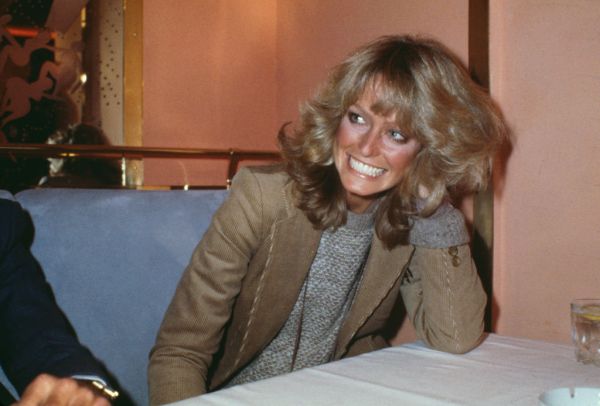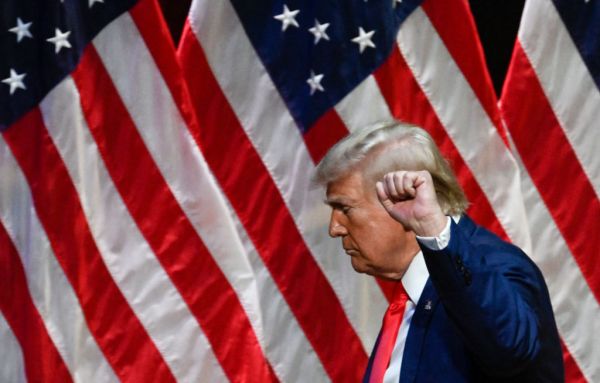Hi,
There is outrage across the political right that “the media” hid Joe Biden’s condition from the American people. I think two things are simultaneously true: This claim is widely—and often wildly—overstated, and there’s plenty of evidence to support a version of it.
But it’s just a fact that “the media” reported on concerns about Biden’s age and acuity. Cathy Young beat me to the punch with a deep dive into the receipts, but here’s a CNN story from almost exactly two years ago. It begins: “White House press secretary Karine Jean-Pierre dismissed concerns Monday that President Joe Biden’s age or stamina might pose a challenge for his reelection bid, saying, ‘That is not a question that we should be even asking.’’’ (Emphasis mine.)
This was around the time Jean-Pierre was claiming she couldn’t “keep up” with Biden because he was so energetic. She was widely mocked for it.
I could have picked dozens of other examples, but I think this one is worth pausing on for two reasons. First, it’s outrageous that the White House would say that the press shouldn’t even ask about the president’s mental health and fitness. But, also, this is the kind of thing press secretaries say when they know they have a problem. You don’t say, “These aren’t the droids you’re looking for,” if you don’t have any droids with you in the first place. And you don’t say, “Don’t even ask about the president’s mental fitness” if you don’t think there are any problems.
Here are a couple of things Cathy doesn’t mention: In January 2022, Newsmax White House correspondent James Rosen asked Biden directly why half the electorate didn’t think he was “mentally fit.” Biden also had a primary opponent in 2023 named Dean Phillips, whose only critique of the president was that he was too old for the job. I saw him on TV quite a bit. Even Saturday Night Live got in on the action.
I come down a little harder on the White House press corps than Cathy does. I think it’s fair to say the issue was downplayed more than it should have been. It’s pretty obvious that much of the press corps agrees, which is why they’re making up for lost time and now giving Jean-Pierre and Biden a brutally hard time. I don’t blame them—being a White House reporter is prestigious but kind of ceremonial. The extent of Biden’s decline is rightfully very embarrassing for them as a group. I mean, why have a White House press corps if they can’t report the story about the president’s cognitive decline until it spills out in a presidential debate? They let themselves be stonewalled and misled by the Biden Praetorian Guard.
But contrary to a lot of outraged media critics out there, I think this had less to do with partisan wagon-circling per se and more to do with anti-Trumpism. The mainstream political press hates or fears Trump and is at least as susceptible to the distortion field of binary-choice-ism as anybody else.
CNN’s Hadas Gold said the quiet part out loud after the debate: “It can be tricky to report on something as difficult to define as a person aging, when his opponent is a convicted felon, who regularly lies and has threatened to use the government to go after his political opponents.”
I’m a CNN contributor and have no desire to needlessly make trouble for myself, for Gold, or for CNN. But come on.
In physics, there’s this thing called quantum entanglement, where seemingly independent particles can influence each other, even when billions of miles apart. This ain’t that. I don’t think it’s particularly difficult to define aging, though I agree it can be complicated because people age differently. But whatever the complications may be, I don’t think they are contingent on the legal or political status of Joe Biden’s opponent. I mean, the guy is the president of the United States. His age and mental fitness are newsworthy, independent of his political opponent. Is the upshot that if Biden were running against Mitt Romney, the press would have investigated Biden’s fitness more responsibly?
In fact, you could argue—or at least I could and do argue—that if you think it’s vital that Trump be kept out of the White House, the case for aggressive reporting becomes stronger. Maybe if the press were more intrusive and skeptical of White House claims, a more competitive challenger would have emerged, or Biden would have opted not to run, or he might have been more honest with the public so that it could price in his infirmity rather than be shocked by it. It’s very hard for me to see how the current situation is the best of all possible outcomes, proving the press has handled this stuff just right.
Or maybe all of these political calculations are wrong. That’s fine—because I don’t care.
It doesn’t matter, or at least it shouldn’t. Objective reporters aren’t supposed to be making such political calculations in the first place. That’s above their pay grade. As I wrote last week, one of the reasons you should do the right thing is that it’s hubristic folly to think you can manage reality and herd all of the possible outcomes like obedient sheep by shading the truth. Events aren’t sheep; they’re surly cats that will not be herded by force of intellect or clever “framing.”
It just strikes me as axiomatically the right thing to do for the press to be really curious about the mental and physical fitness of the dude in charge of launching nukes, regardless of the partisan consequences. I guess I’m just old-fashioned like that. And that holds true, even if you think—for good reason—that his opponent has no business controlling nukes either.
Deflate the Media
I think part of the problem is that journalists think they are more powerful than they really are, and, as Spider-Man learned the hard way, they believe that with great power comes great responsibility. What other profession—particularly one that spends so much time and energy obsessing about ethics—is populated by people who think politics should influence their work? Imagine a surgeon saying, “It’s hard to operate on an aging patient properly when his opponent is a convicted felon who regularly lies and has threatened to use the government to go after his political opponents.” Or a lawyer explaining how hard it is to represent a client in such a situation. We’d all make fun of a plumber who said, “It’s hard to snake the clogged toilet of a president when his opponent is a convicted felon …” But journalists hold conferences agonizing about this kind of thing because, you know, democracy dies in darkness.
But enough with the media criticism. No really, enough with it. Because you know who else thinks journalists are much more powerful than they really are? Everyone who obsesses about how terrible the media is.
That’s my problem with this media “cover-up” stuff. Nobody bought it! Polls have shown that Americans think Biden is too old to run for president for a long time. Here’s just a smattering of headlines.
- Politico, November 10, 2023: “Voters are worried about Biden’s age. He knows it.”
- ABC News, May 7, 2023: “Broad doubts about Biden’s age and acuity spell Republican opportunity in 2024: POLL.”
- NPR, February 18, 2023: “Many voters think Biden is too old for a second term. The White House isn’t worried.”
- The Atlantic, June 16, 2022: “Why Biden Shouldn’t Run in 2024: Yes, he’s fit to be president right now. But he’s too old for the next election.”
- The Wall Street Journal, September 4, 2023: “Biden’s Age, Economic Worries Endanger Re-Election in 2024, WSJ Poll Finds.”
Now, it’s true that some in the media pushed back against Republican claims that Biden is “senile.” But some of that pushback was warranted at the time. And again, the press should have pushed back much harder at White House claims that he wasn’t senile. It’s fine to fact-check the opposition party, but not to the exclusion of fact-checking the party in power.
But here’s the thing. If the media has been covering up Biden’s infirmity, how is it that polls showed the vast majority of Americans, including Democrats, thought he was too old? Conservatives—including yours truly on occasion—have been avidly mocking Biden’s age-related deficiencies for years. But many on the right are now acting like no one else knew until the debate. Did I imagine all of the spinning, pro and con, about Biden’s State of the Union Address proving—or failing to prove—that age wasn’t an issue? Pretty much every conservative podcast I listen to—and appear on!—has been talking about Biden’s deterioration for years.
What’s particularly bizarre is that nearly all of the serious pre-debate punditry rested—correctly—on the fact that Biden called for an early debate to reassure voters he was up to the job so he could “change the narrative” about him being too old. He utterly failed. But again, that whole conversation was in response to the widespread view Biden is too old and out of it. It’s gaslighting to pretend that Biden isn’t too old. It’s also gaslighting to pretend no one has been arguing about or reporting on this stuff.
The problem goes far beyond Trump. Many pro-Trump partisans have convinced themselves that Trump’s longstanding unpopularity can be explained by a similar indictment of “the media.” Obviously, the press has gotten out over its skis more than a few times in going after Trump. It would be impossible and ridiculous to deny that.
(Though, hilariously, many Democrats are now peddling the broken-brain claim that the press is tougher on Biden than Trump, which just helps highlight that we have a bipartisan problem with partisan idiocy in this country. “Going forward,” tweeted Kurt Bardella, a one-time GOP operative who is now a DNC adviser. “I hope the media scrutinizes and fact-checks Donald Trump with the same vigor and enthusiasm they are with President Biden.”)
However much unfair media coverage hurt Trump—media coverage Trump relentlessly sought, by the way—it pales in comparison to the fair media coverage that simply conveyed his words and deeds accurately. His absurd pandemic press conferences hurt him more than any write-ups of his absurd pandemic press conferences, just as Biden’s debate performance hurt him more than the coverage of his debate performance.
But as I have learned in recent days, talking people out of their reflexive defense of their preferred president is virtually impossible. So, let’s talk about something else.
You know what gets an enormous amount of slanted coverage? Climate change. No, really, I defecate you negatory.
The mainstream media is obsessed with educating—one might say “browbeating”—the public on the climate crisis. As of 2021, for instance, the New York Times had 12 full-time staffers and more than 80 correspondents worldwide covering the issue, according to The Drum. That year, it published 4,000 articles dealing with the subject. Four. Thousand. In 2022, the Washington Post expanded its climate desk to 30 full-time journalists. I admittedly haven’t studied all of this output closely, but I am confident the coverage overwhelmingly—perhaps even exclusively—is somewhere between “climate change is a grave problem” and “climate change is an existential crisis.” And keep in mind, their coverage is aided by an unceasing stream of books, papers, college courses, foundation reports, celebrity stunts, propagandistic movies, corporate ad campaigns, Democratic policy initiatives, and U.N. warnings. This kind of groupthink is probably how you end up with headlines like “James M. Inhofe, Senator Who Denied Climate Change, Dies at 89.”
But my point here isn’t to argue with any of it. We can do that another time.
My point is that all of this coverage has been wildly ineffectual. If the media is so frickin’ powerful, why do voters refuse to care about climate change as much as the biggest media outlets say they should? For 15 years, YouGov has asked what issues were most important to American voters, and for 15 years, “climate change and the environment” scored below a slew of other issues—often well below. It did pretty well in 2024, landing in fifth place—with a whopping 7 percent of respondents saying it was their No. 1 issue. Gallup’s and Pew Research Center’s findings land in roughly the same place.
Now, it’s absolutely true that if you ask Americans whether they’re “concerned” or if they think it’s an important issue, the percentages increase. But some of that is social desirability bias. People are supposed to say they’re concerned about climate change, racism, etc. Despite an unrelenting media campaign that tells voters they should vote based on climate change, there’s very little evidence that they do.
In fact, there are countless issues where the mainstream media is almost exclusively on one side of the issue—guns, immigration, voter ID, racial quotas, etc.—and the public refuses to be “educated” the way editors and reporters want them to be. Hell, if the media was so powerful, how the hell is Trump winning?
The funny thing is right-wing media critics routinely make this point—when it serves their purposes. If I had a dime for every time I heard someone on Fox News say some version of “the media is totally discredited,” I could start my own cable news network. But the moment events don’t go their way, they start insisting that it’s all because of the all-powerful media. Which is it? Has it lost all credibility? Or is it successfully brainwashing Americans on behalf of the Deep State? Logically, you have to pick one, because both can’t be true.
Fortunately, it’s a trick question, you don’t have to pick either option—because neither option is true.
Author’s Note: I am on a short quasi-vacation before the Republican National Convention next week. In fact, I started this “news”letter on a plane to Montreal. And I’m finishing it in the passenger seat en route to our destination (back in America). I don’t know if there will be a Friday G-File. But there will be podcasts (Dispatch and Remnant), including the release tomorrow (I believe) of the long-awaited debate about “Soviet America” with Niall Ferguson. The dogs are in good hands.









Please note that we at The Dispatch hold ourselves, our work, and our commenters to a higher standard than other places on the internet. We welcome comments that foster genuine debate or discussion—including comments critical of us or our work—but responses that include ad hominem attacks on fellow Dispatch members or are intended to stoke fear and anger may be moderated.